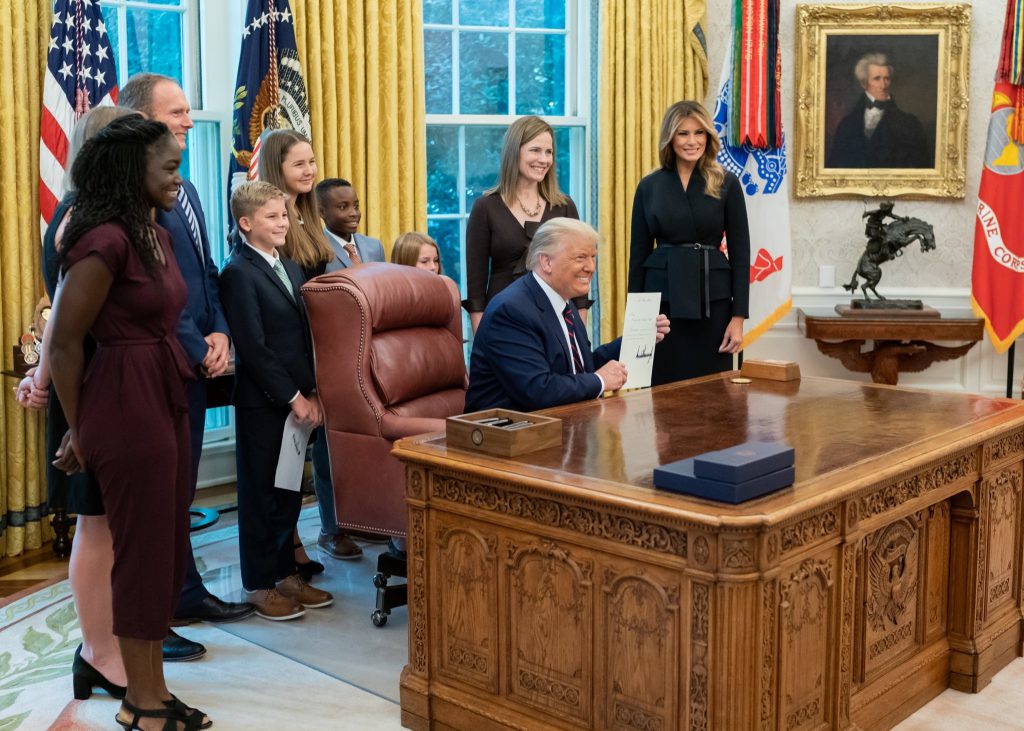
Published September 27, 2020
Amy Coney Barrett has been praised for her topflight legal mind, even by those who disagree with her. At 48 years old, she is poised to help shape the court for a generation or more.
But that’s not all her elevation to the high court has the potential to accomplish. Barrett’s expected confirmation should serve as a catalyst for rethinking the most powerful social movement in the last half century: feminism.
Over the last week, as Justice Ginsburg’s body laid in repose outside the Supreme Court, the nation has rightly celebrated Ginsburg’s trailblazing 1970s legal advocacy, one which pushed both law and culture to reexamine the ways in which women had been pigeonholed as caregivers and men as providers. The late justice’s antidiscrimination wins opened up a new era in which both men and women could respectably and responsibly engage in both avenues of fulfillment, according to their personal talents and circumstances.
But Ginsburg also viewed abortion rights as central to sexual equality, and her leadership helped give rise to a movement that remains laser focused on abortion to this day. Yet rather than make women more equal to men, constitutionalizing the right to abortion as the court did in Roe has relieved men of the mutual responsibilities that accompany sex, and so has upended the duties of care for dependent children that fathers ought equally to share.
Barrett embodies a new kind of feminism, a feminism that builds upon the praiseworthy antidiscrimination work of Ginsburg but then goes further. It insists not just on the equal rights of men and women, but also on their common responsibilities, particularly in the realm of family life. In this new feminism, sexual equality is found not in imitating men’s capacity to walk away from an unexpected pregnancy through abortion, but rather in asking men to meet women at a high standard of mutual responsibility, reciprocity and care.
At Barrett’s Senate confirmation hearing in 2017, Sen. Dianne Feinstein tellingly remarked, “You are controversial because many of us that have lived lives as women really recognize the value of finally being able to control our reproductive systems, and Roe entered into that, obviously.”
Barrett’s life story puzzles older feminists like Feinstein because bearing and raising a bevy of children has long implied retaining a traditional life script — like staying home with the children — that Barrett has obviously not heeded.
To be sure, few mothers of seven could become federal judges, never mind Supreme Court justices. Barrett – “generationally brilliant,” according to her Notre Dame colleague, O. Carter Snead — is likely alone in this set. It all seems so unlikely: She has risen to the pinnacle of her profession while at once being “radically hospitable” to children, as Snead has described her. An enigma to many, she doesn’t easily fit into any ideological box.
If we’re really intent as a country on seeing women flourish in their professions and serve in greater numbers of leadership positions too, it would be worthwhile to interrupt the abortion rights sloganeering for a beat and ask just how this mother of many has achieved so much.
In a 2019 conversation at the Notre Dame Club of Washington D.C., Barrett was asked how, while raising so many children, two of whom were adopted from Haiti and one who has special needs, she has been able to balance family life with her demanding profession. Her response was as telling as Feinstein’s 2017 remark. Barrett immediately praises her husband (who is also an attorney):
We were open to either one of us staying home at different points… What’s really made it work is that it’s very much a team effort… Right now… Jesse is really doing much more of the heavy lifting… the cooking and kids’ doctor’s appointments during the day. We’ve gone in cycles and right now… he’s doing a little bit more of the home stuff…. We evaluated at every step whether things were working well for the family, for the job I was in… but it was always working and it worked well: the kids were very happy, I loved teaching.
Barrett says that for both parents, the needs of the Barrett children came first, their professions second – and yet both their children and professions thrived. Rather than assume caregiving is a woman’s “choice” to embrace or reject on her own, as Roe does, the Barretts recognize that both mothers and fathers are encumbered by their shared responsibilities to the dependent children in their care. That’s the new feminism building upon, while remaking, the old feminism.
It’s not only the Barretts’ teamwork that has made all of this possible. In that same interview, she speaks with gratitude about the consistent child care her husband’s aunt has provided for more than a decade. And she points to the flexibility of her workplace and credits the growing presence of women in the legal profession as giving rise to better working conditions than when she was a young lawyer: “As women are more present in law schools… on faculties, at law firms… the workplace bends to be more flexible as women seek those accommodations.” As women seek those accommodations… by bearing and raising children rather than sacrificing their very lives on the altar of the marketplace instead.
The sad truth is that nearly 50 years after Roe legalized abortion nationwide, the kinds of accommodations that make childbearing and family life manageable are only beginning to be implemented. Large numbers of companies still engage in rampant pregnancy discrimination. Studies show that women with caregiving responsibilities are often assumed to be less competent or committed to their work than their unencumbered peers; and when mothers or fathers seek to return to work after caring for children, even a short time, their market absence is more greatly penalized by prospective employers than had they simply been unemployed. When a prominent corporate leader – and contender for presidential nominee of the Democratic Party — is reputed to have told a pregnant employee to “kill it,” it’s no wonder women feel the need to hide that they are pregnant when they are at work.
When we belittle the moral status of the unborn child, treating the nascent human being in a near half century of Supreme Court case law as “potential life,” or in academic (and popular) arguments as something parasitic upon the pregnant woman, we ought not be surprised when our workplaces and other cultural institutions treat dependent human beings that way too. If pregnancy continues to be likened to any other lifestyle choice, or worse, a disability in a Hobbesian contest with wombless men — pregnant women and caregiving parents will never receive the cultural support they need.
To be sure, Justice Ginsburg’s 1970s’ wins paved the way for a woman of Barrett’s talent to emerge; at her nomination announcement, Barrett seemed immensely grateful for that. But Barrett knows the secret of a culture that fully supports family life: No professional work — even that of a Supreme Court justice — can best the essential work of a mother or a father, whether a parent has many children or only one.
In recounting how she decided to go through with their second adoption, Barrett said: “What greater thing can you do than raise children? That’s where you have your greatest impact on the world.” And when a justice of the Supreme Court showcases this truth by her very life, this long-abandoned insight can finally begin to reemerge across our culture.
When greater numbers of us understand the cultural priority of caregiving, a movement will grow strong enough to challenge the dominant market mentality that disfavors family obligation for both women and men. Justice Ginsburg’s brand of feminism will give way to something new, a society in which we will no longer fight over abortion because it will have become irrelevant.








